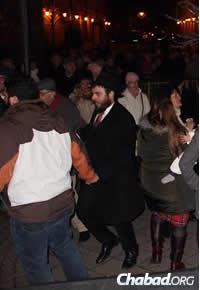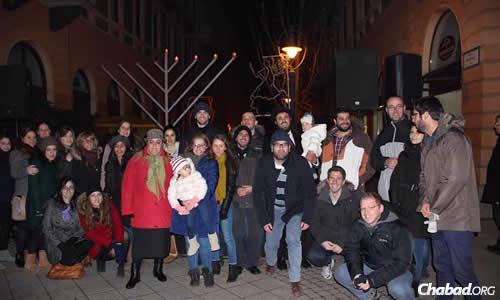The second in a series of three articles on Jewish life in Hungary.
Debrecen, Hungary, might seem like an odd destination for a young Chabad couple looking to put down roots. After all, the city’s native Jewish population—comprised mostly of a few hundred seniors—is rapidly dwindling, and it’s located more than 200 kilometers from Budapest, the closest vibrant Jewish community.
Yet Rabbi Shmuel Faigen, who has been living there since 2010 with his wife, Riki as co-directors of Chabad on Campus of Debrecen says that many “small” accomplishments have come together to make their stay there worthwhile.
Faigen first visited Debrecen in 2008 while a student at the Pesti Jesiva, the Chabad-run institution for advanced Torah scholarship in Budapest.
“There are approximately 400 Israelis who come to study medicine and dentistry at the University of Debrecen, and Rabbi Shmuel Raskin, director of the Keren Or Chabad Israeli Center in Budapest, suggested that I reach out to them,” recalls the Israeli-born Faigen. “One visit led to another, and soon, we became very involved with the students.”
As early as 2003, students from the Pesti Jesiva had been traveling to Debrecen to hold Shabbatons and other types of events for the students, but Faigen was the first to begin visiting on a weekly basis.
Discovering Commonalities
After getting married, Faigen and his bride, also from Israel, decided to call Debrecen home.
They live in a rambling house on a tree-lined side street with their two toddlers. The upper floor serves as their residence, and the lower level works as the Chabad House, a virtual island of Judaism for students who find themselves far away from home. Every week, between 50 and 100 young people gather there to pray, celebrate and enjoy home-cooked Israeli-style fare.

At the same time, the Faigens threw themselves into helping the elderly locals. Amazingly, the city still has a fully functioning synagogue with daily prayer services. The city’s large synagogue is too big for the now truncated community, so regular services are held in a smaller, newly renovated synagogue.
As a rabbi at the community, Faigen says he also leads services for around 20 local worshippers every Shabbat and even teaches Torah in Hungarian, known to be one of the hardest European languages to master since it is not related to the Germanic, Slavic or Romance families.
Although the young Israelis and elderly Hungarians seem to have little in common at first, Faigen says he has discovered that they gain tremendously from each other. For example, this past Chanukah, more than 100 students visited Holocaust survivors in their homes, lit Chanukah candles together and spent the evening celebrating their common heritage over sufganiyot, traditional holiday doughnuts.
Other joint programs include a public Chanukah menorah-lighting attended by the mayor of Debrecen, Kósa Lajos, and the rector of the university, Professor Zoltán Szilvássy; a Lag B’Omer bonfire; and a public Passover seder conducted in both Hebrew and Hungarian for 200 people.
Of course, serving an aging community brings with it something else—its fair share of funerals. That said, Faigen notes that on the flip side, he has officiated at five weddings this past summer for medical students—many of whom met over hummus and gefilte fish at Chabad.

Due to the socio-political climate in Israel—where people commonly associate religion with politics—Faigen acknowledges that with Israeli students, he has to shatter many preconceived notions about Judaism.
“There was one fellow who told me point blank he wanted nothing to do with me or Jewish practice,” he says. “Then, just this past Friday, he messaged me asking if I could show him how to put on tefillin.
“And there was another guy who came to our classes on medical ethics, which was specially written by Rabbi Baruch Oberlander of Budapest, just to get credits at the university, but told me that he had no interest in any of our other programs. Then he started dropping in for Shabbat meals. Slowly, his outlook changed. Just recently, he asked for a mezuzah for his door.
“And there are others. There are more than 15 girls who started lighting Shabbat candles every week, boys who put on tefillin and many students who keep kosher,” he says with satisfaction. “These are the things that make it meaningful for us.”






Start a Discussion